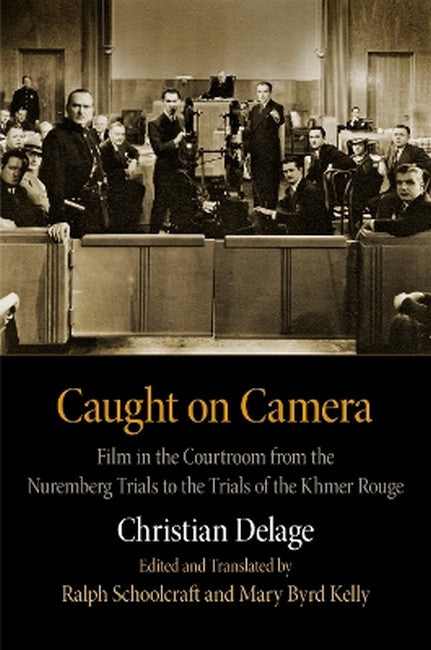Christian Delage is a historian and filmmaker based at the University of Paris-VIII, who has been elected the incoming Director of the Institut d'Histoire du Temps Present. He has also taught at the Institut d'Etudes Politiques (IEP) in Paris and the Cardozo Law School in New York. His film Nuremberg: The Nazis Facing Their Crimes, narrated by Christopher Plummer, was released in 2007 and is now available on DVD. He served as a policy advisor on the filming of the Khmer Rouge trials and produced Cameras in the Courtroom, a documentary about the filming of legal trials. Ralph Schoolcraft is Associate Professor of French at Texas AandM University. He is author of Romain Gary: The Man Who Sold His Shadow and translator of The Haunted Past: History, Memory, and Justice in Contemporary France by Henry Rousso, both available from the University of Pennsylvania Press. Mary Byrd Kelly teaches in the Department of French and Italian at the University of Kansas.
Request Academic Copy
Please copy the ISBN for submitting review copy form
Description
Editor's Note Introduction PART I. FILM AS EVIDENCE: AN AMERICAN JURISPRUDENCE (1920-1945) Chapter 1. The Filmmaker, the Judge, and the Evidence Chapter 2. The Camera: An Impartial Witness of Social Relations? Chapter 3. Learning to Read Enemy Films Chapter 4. Face to Face with Nazi Atrocities PART II. THE STAKES OF THE INTERNATIONAL MILITARY TRIBUNAL (NUREMBERG, 1945-1946) Chapter 5. "Establishing Incredible Events by Means of Credible Evidence" Chapter 6. Getting Film into the Courtroom Chapter 7. Catching the Enemy with Its Own Pictures PART III. NUREMBERG HISTORY ON FILM Chapter 8. The Un-United Nations and the Ideal of a Universal Justice Chapter 9. Documentary Archives and Fictional Film Narratives PART IV. THE ERA OF JUSTICE ON FILM (1945 TO THE PRESENT) Chapter 10. Trials of the Present or the Past? Chapter 11. Hearings on Film, Film in Hearings Chapter 12. The Face of History Chapter 13. The Spectator's Place Chapter 14. Court Settings and Movie Stagings: From Nuremberg to the Khmer Rouge Trial Conclusion Notes Bibliography Index Acknowledgments
"While other scholars have focused on film-as-evidence or trial-as-film, Christian Delage, a historian and documentary filmmaker, addresses both in this meticulously researched book. Tracing the double history of the use of film in legal cases and the filming of court proceedings, Delage reveals how what we see on film in and of human rights trials is a modern construction rooted in the Holocaust and its aftermath. . . . Caught on Camera will be of interest to anyone wanting a historical lens through which to analyze our culture's current obsession with cell phone-generated footage and its potential to transform adjudication for human rights abuse." (American Historical Review) "Caught on Camera provides an invaluable overview of the role films played in the historic international criminal trials that so indelibly marked the second half of the twentieth century. Ranging in scope and rich in reference, this admirable book shows how prosecutors used films as evidence in court and how court sessions were themselves filmed and widely diffused for public audiences. As the international community continues to struggle with the legacies of Cambodia, Bosnia, Rwanda, and Darfur, the original perspectives Christian Delage offers will helpfully inform the ongoing quest for justice." (Stuart Liebman, Professor Emeritus, CUNY Graduate Center) "Meticulously researched and highly topical, Caught on Camera is the first scholarly work to tell the story of the impact of film on advocacy, trials, and legal judgment. Historian, filmmaker, critic and adjunct professor of law, Delage is ideally qualified to uncover the extraordinary narrative of the introduction of film into legal evidence in the Nuremberg trials and its subsequent and expanding role in tribunals and international criminal proceedings to the present day. In a meticulously researched and fluently argued analysis, this book not only exposes the link between visual evidence and war crimes trials but also, and even more surprisingly, shows how film has subtly and persistently impacted the staging, process, performance, and even architecture of law." (Peter Goodrich, Cardozo School of Law)

